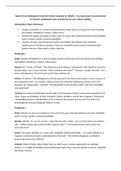Summary
Summary OTHELLO ESSAY PLANS A Level English Literature (Themes) (Edexcel)
- Module
- Unit 1 - Drama
- Institution
- PEARSON (PEARSON)
7 ESSAY PLANS IN THIS BUNDLE Essay plans summarising the key aspects of the many themes that appear in Othello. Includes the themes of jealousy, gender, manipulation, order and choas, passion and the self, race and reputation. These essay plans feature topic sentences, quotes, critical statem...
[Show more]




